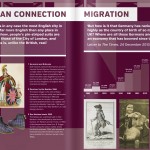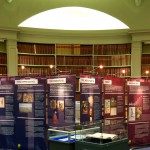17 March, 2016

Great Minds: Dame Stephanie Shirley in conversation with Afua Hirsch
Thursday 17 March 2016 ⎪ 6:30–9pm
Hogan Lovells, 50 Holborn Viaduct, London
Admission free ⎪ Reserve your ticket here
For the next event in our Great Minds series, we invite you to hear from tech entrepreneur, ardent philanthropist and workplace revolutionary, Dame Stephanie Shirley.
The event will begin at 6.30pm with a talk from Dame Stephanie about her life and work, leading into conversation with Afua Hirsch who will then chair an audience Q&A. The event will be followed by a refreshments reception, during which there will be an opportunity to buy Dame Stephanie’s book, Let IT Go.
28 September, 2015

Germans in Britain at the London School of Economics
28 September-6 November 2015 ⎪ Opening hours: Mon-Fri 10am-8pm
Free admission⎪Open to all⎪Click for details
LSE Atrium Gallery, Old Building
Explore the rich and fascinating history of German migrants to Britain in this pop-up exhibition.
Germans have had an immense impact on British life over the centuries. Find out how British sport, science, banks, businesses, music, monarchs, art and design have all been shaped by their German connections.
This fascinating story is peppered with both familiar and unfamiliar names. Many people know about Ludwig Guttmann, whose work at Stoke Mandeville hospital in effect founded the Paralympic movement; but what about the Nuremberg engineer who founded Triumph motorbikes in Coventry? Or the early 19th century German chemist whose company eventually became British Gas?
Other famous British brands such as Dr Martens and Persil are also a product of Anglo German cooperation. One of Britain’s best-known seaside buildings, the de la Warr Pavilion in Bexhill, was designed by a German architect, and English art would not be the same without Hans Holbein, who brought Renaissance painting to the court of Henry VIII.
Germans in Britain is curated by Dr Cathy Ross, Honorary Research Fellow at the Museum of London.
14 August, 2015

Germans in Britain at the University of Aberdeen
14 August – 24 September 2015⎪Opening hours
Free admission⎪Open to all
University of Aberdeen – the Sir Duncan Rice Library
Event Space (adjacent to the Gallery) on the ground floor
Explore the rich and fascinating history of German migrants to Britain in this pop-up exhibition.
Germans have had an immense impact on British life over the centuries. Find out how British sport, science, banks, businesses, music, monarchs, art and design have all been shaped by their German connections.
This fascinating story is peppered with both familiar and unfamiliar names. Many people know about Ludwig Guttmann, whose work at Stoke Mandeville hospital in effect founded the Paralympic movement; but what about the Nuremberg engineer who founded Triumph motorbikes in Coventry? Or the early 19th century German chemist whose company eventually became British Gas?
Other famous British brands such as Dr Martens and Persil are also a product of Anglo German cooperation. One of Britain’s best-known seaside buildings, the de la Warr Pavilion in Bexhill, was designed by a German architect, and English art would not be the same without Hans Holbein, who brought Renaissance painting to the court of Henry VIII.
Germans in Britain is curated by Dr Cathy Ross, Honorary Research Fellow at the Museum of London.
7 August, 2015

7 August, 6.00 – 7.00pm
Kurt Schwitters’ ‘Ursonate’
Performed by Florian Kaplick
The Ursonate is a vocal piece consisting of four movements, an overture and finale by artist Kurt Schwitters (1887-1948). Schwitters emigrated from Germany arriving at Edinburgh Leith Docks on 18 June 1940. He first performed the sound poem in 1925 and published it in 1932 as ‘Sonate in Urlauten’ (Sonata in Primordial Sounds). ‘As with any printed music, many interpretations are possible. As with any other reading, correct reading requires imagination’ (Kurt Schwitters).
Florian Kaplick studied piano, conducting and voice training at the Konservatorium Nürnberg and has a special interest in Schwitters’ sound poetry. He has previously performed at Tate Britain and the Edinburgh Fringe. This performance is presented as a ‘Finnisage’ to the exhibition ‘Germans in Britain‘. Doors open at 5.30pm for a last chance to see the exhibition. The performance begins at 6.00pm and lasts about 40 minutes with an opportunity to donate in aid of Scottish Refugee Council by retiring collection.
Reserve your place by calling our usual booking line 0131 314 4300 or emailing enquiries@scotlandspeoplehub.gov.uk.
Adam Dome, General Register House.
This event is part of the programming around MMP’s Germans in Britain exhibition run at the National Records of Scotland.





